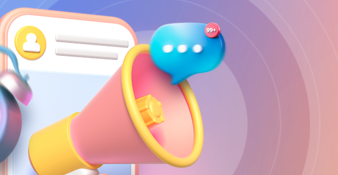10 best airlines of 2019: A social listening report
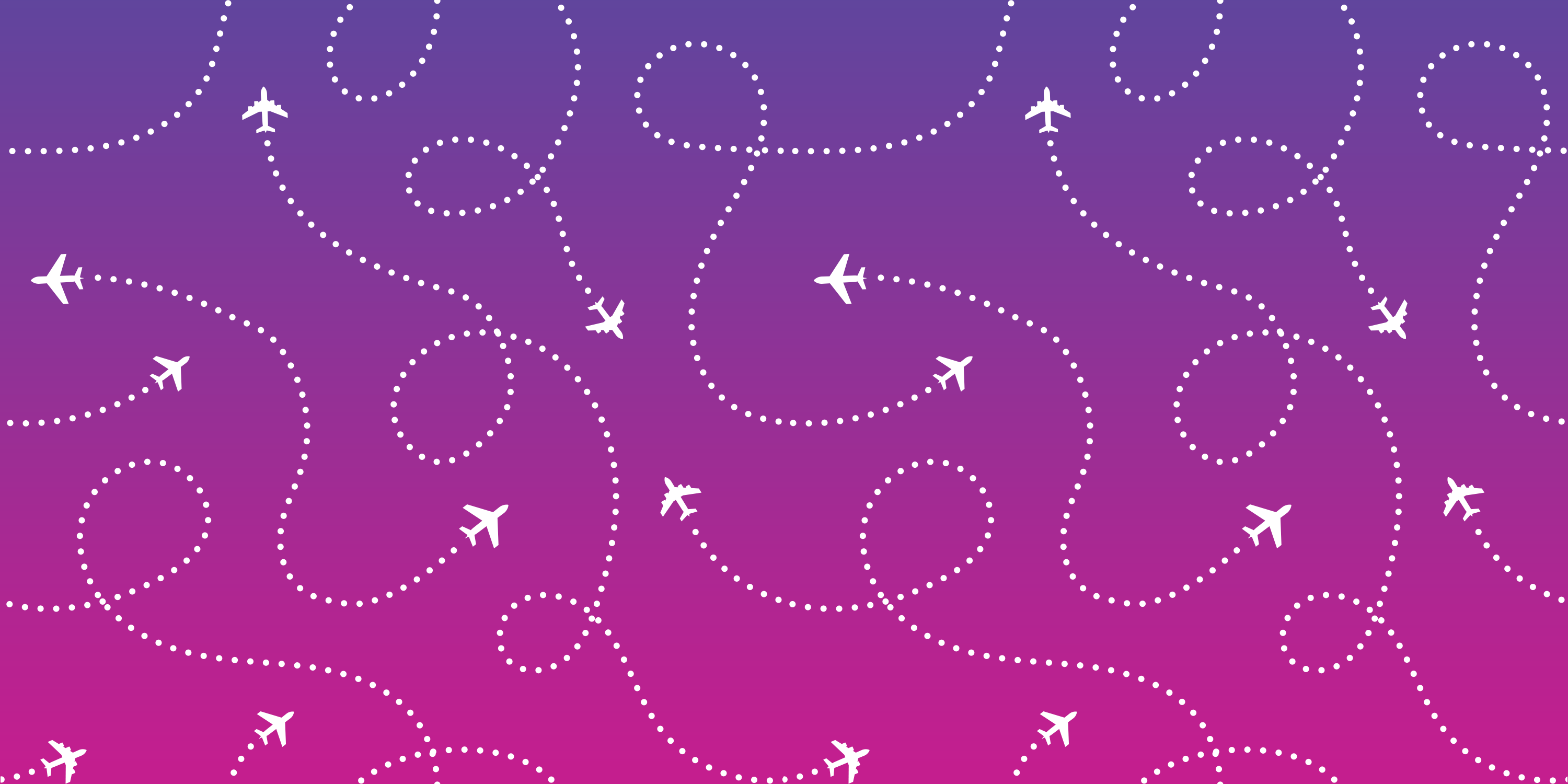
Every business is struggling to get as much data on their consumers as possible, and the aviation industry is no exception. How much are your customers enjoying the in-flight experience, and how would they rate it against a competitor’s? Is your customer service efficient enough, and how does it impact customer loyalty? What do the passengers think about your menu? How would they rate your cabin crew? What is the general public sentiment towards your brand, and how does it compare to the industry average?
We conducted a social listening study in an attempt to help airlines answer these questions, and, with any luck, demonstrate how useful social listening data can be, perhaps in more ways than you expect: from informing product decisions and performing competitive analysis to measuring the success of marketing campaigns and product changes.
This blog post is a brief overview of this study. To download the complete report with all findings and key takeaways, fill out the form below:
For this report, we selected 52 of the world’s leading airlines based on several online rankings (including rankings of the best airlines by Skytrax, Wikipedia, and TripAdvisor). We’ve been tracking social media and news mentions of the 52 airlines in Awario, a social listening tool, over the last 3 months (May 15th through August 15th, 2019). We ended up with 2,860,554 mentions which we analyzed from different perspectives to determine which companies in the airline industry are the most popular with consumers.
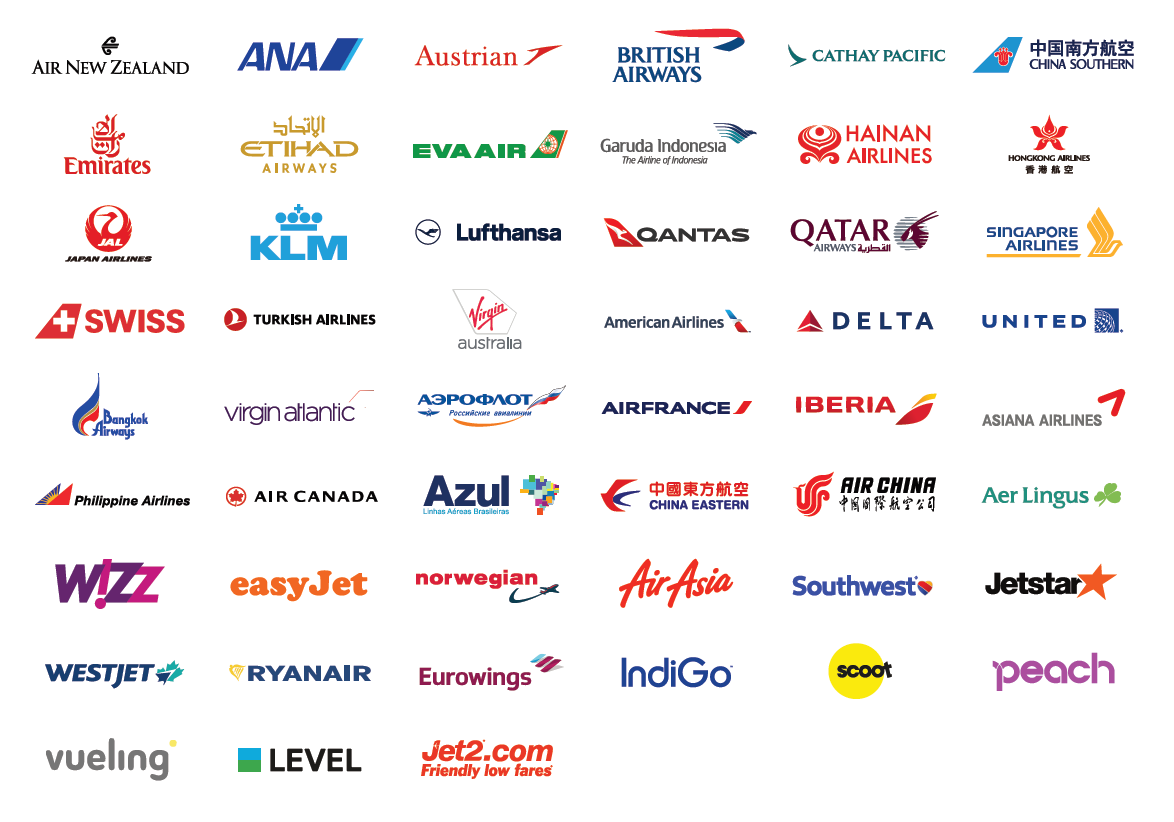
The airline industry: an overview
Before we get to the rankings and winners, let’s take a look at the data as a whole. What can we learn from the mentions of all the airlines, combined?
Share of Voice on social media
Let’s start with an obvious question: which airlines are dominating the conversation on social media (Facebook, Twitter, Instagram, YouTube, and Reddit)?
For any company in the aviation industry, measuring Share of Voice is a great starting point. It lets you see exactly where your brand falls on the spectrum and identify the most discussed companies in the industry (so you can delve into those conversations and explore what’s working best for your competition).
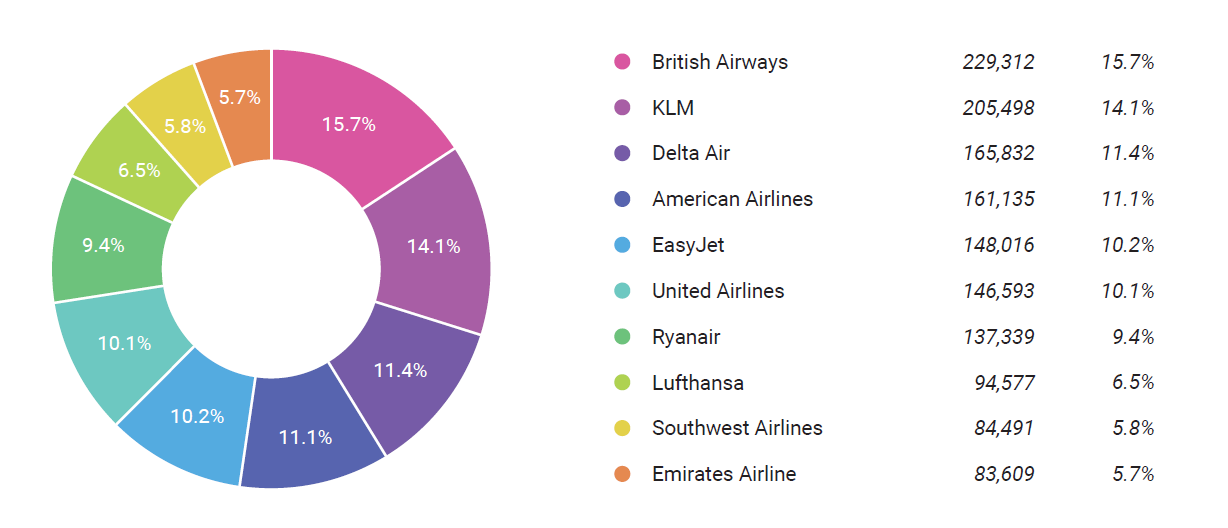 Social media Share of Voice for the 10 most discussed airlines
Social media Share of Voice for the 10 most discussed airlines
Across our data set, British Airways, KLM, and Delta are the three airlines with the biggest social media Share of Voice. You may have noticed that 7 out of the 10 most talked about companies are traditional airlines - only 3 low-cost airlines (EasyJet, Ryanair, and Southwest) made the list.
Sentiment
There are a little more positive mentions than negative ones across the data set: 57.31% vs. 42.69%. This can be a good benchmark for airlines that are measuring the sentiment around their brand, letting them see how it compares to the industry average.
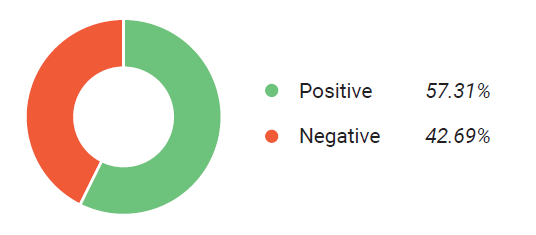 Average sentiment for 52 airlines
Average sentiment for 52 airlines
But benchmarks shouldn’t be confused with goals: aiming for the average won’t get you very far. Here are the top 5 airlines in terms of sentiment, headed by All Nippon, an impressive 84.31% of whose mentions are positive.
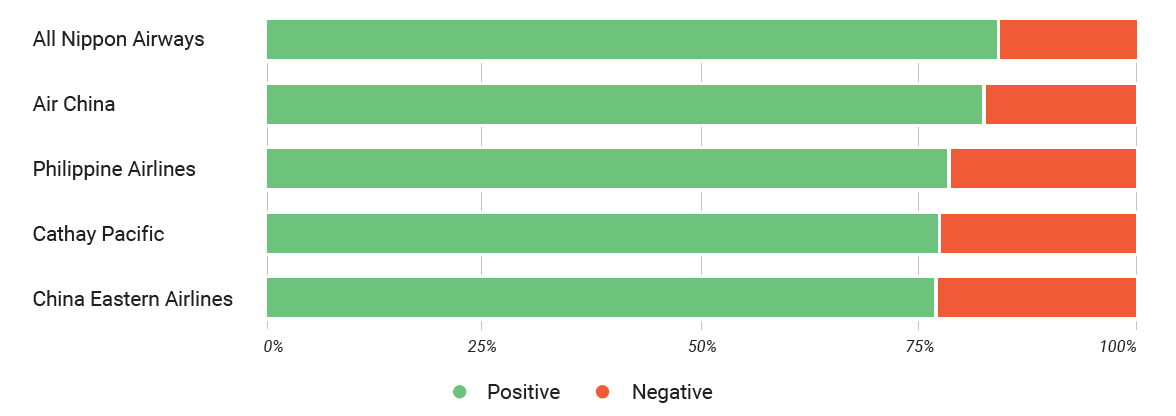 5 best airlines by sentiment
5 best airlines by sentiment
Topics
Finally, let’s take a quick look at the key themes within our data set. For the word cloud below, we analyzed all the social media mentions in English to reveal the most frequently mentioned words. We’ve deliberately filtered out the airlines’ names to find out what passengers tend to talk about - besides the airlines themselves.
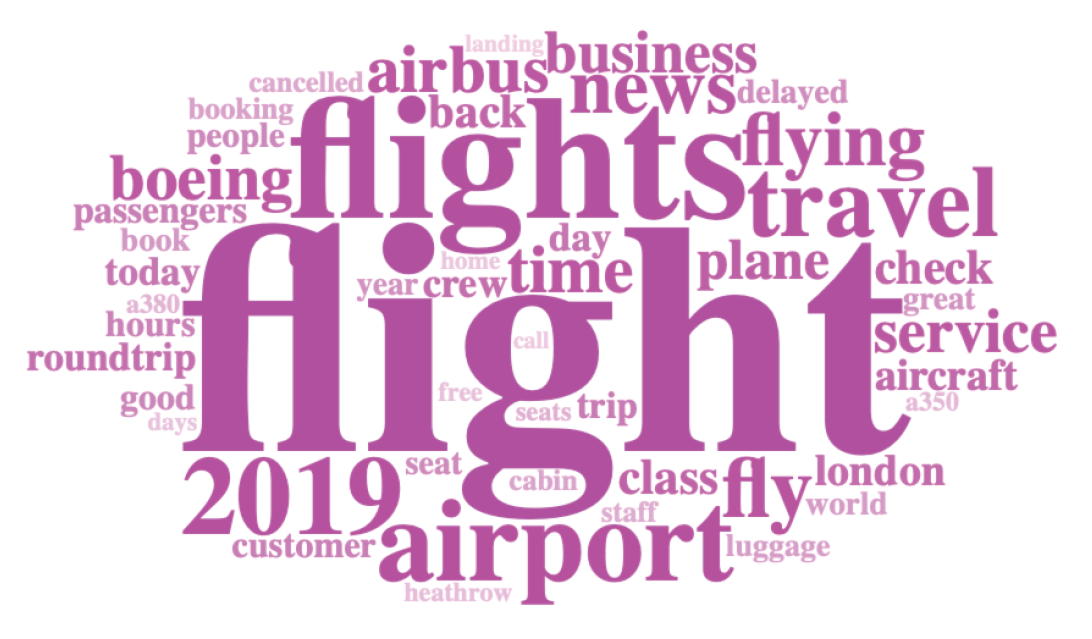 Key topics within the mentions of all airlines
Key topics within the mentions of all airlines
The word cloud above includes plenty of words that are pretty obvious: flights, airports, and planes. However, if you look closer, you might stumble upon a few exciting discoveries. For example, passengers are talking a lot about Boeing and Airbus (particularly the A380 and A350 airliners). Airline staff and cabin crew are among the most discussed topics. Perhaps less surprisingly, delays and cancellations also get their fair share of mentions.
The best airlines of 2019 (according to passengers)
Methodology
To come up with this ranking, we analyzed the traditional airlines in our data set and measured every company’s performance against 3 crucial social listening metrics:
1) Number of mentions, or the volume of conversations mentioning each airline across Twitter, Instagram, Facebook, Reddit, and YouTube.
Why? The volume of mentions is a basic indicator of how well-known a brand is, especially when compared to other brands in the industry.
2) Sentiment. For every airline, we calculated net sentiment - the ratio of positive mentions to negative ones (excluding neutral mentions all together).

Why? A lot of mentions isn’t always a good thing. If social media users generate a lot of buzz by complaining about a brand’s customer service, this doesn’t make the company popular with consumers. Our goal was to produce a ranking of airlines that aren’t just talked about a lot, but are also loved by their customers.
3) Reach, which is Awario’s estimate of the number of impressions the mentions of each brand received (based on the authors’ follower counts and the posts’ engagement).
Why? While we used Mentions to measure the volume of conversations around each brand, with Reach we’re measuring brand awareness, or the impact of those conversations. Reach is important to measure because not all mentions are created equal. For example, if you compare Delta Air and American Airlines, you can see that even though more people talk about Delta on social media, American wins in terms of the number of people who hear about them - simply because social media users who mention the brand tend to have a bigger audience.
For every metric, we normalized the data and assigned a score of 100 to the airline with the best result, and a score of 0 to the one with the lowest value. Finally, we added up the scores and divided the final value by 3 to come up with an overall social listening score.

World’s top 10 airlines
 Social listening metrics for mentions of British Airways
Social listening metrics for mentions of British Airways
This summer hasn’t been plain sailing for British Airways. But while the news about the company’s IT meltdown, a plane filling up with smoke, and a substantial fine over a data breach did spread on social media, they didn’t shake the company’s reputation - BA’s net sentiment remains positive. The brand doesn’t just win in the overall ranking; it has the biggest reach and volume of social media conversations among all traditional airlines within our data set. And it’s no surprise: it’s hard not to win customers’ hearts with an odd mention from the likes of Conan O’Brien and Jeremy Clarkson.

 Social listening metrics for mentions of American Airlines
Social listening metrics for mentions of American Airlines
American Airlines’ social media presence is very balanced: there haven’t been viral news stories about it this summer, neither positive nor negative. But even though the company didn’t get a 100 score in any of the 3 parts of our assessment, its performance has been very strong in all 3: it scored 69.9 for the volume of mentions, 45.5 for its sentiment, and 47.3 for reach. An overall score of 54.23 puts American Airlines in second place.
 Social listening metrics for mentions of KLM
Social listening metrics for mentions of KLM
KLM came second in terms of its social media Share of Voice, just 14,000 mentions behind British Airways. But because American beat KLM both in terms of sentiment and reach, the company comes in third in the overall ranking.
One story that really took off with social media users - and that is partly responsible for KLM’s 3rd place in this ranking - was the airline’s plans to build a futuristic V-shaped jet with in-wing seating that will use 20% less fuel.
Those were the top 3 carriers in our ranking. To find out which other companies made it to the top 10, download the full Airline Industry report at the end of this article.
Other findings
Apart from determining which airlines were the most popular with consumers, the report looks at several other aspects of passenger experience. Other rankings included into the report are:
- Airlines with the best customer service
- Airlines with the best cabin crew
- Best low-cost airlines
- Airlines with the best in-flight meals
- Airlines with the best PR
Here are some highlights from these rankings.
AirAsia: best low-cost airline & best in-flight meals
Thanks to its brilliant marketing, AirAsia won in 2 out of the 5 categories we looked at. It came first in the Best low-cost airlines ranking, despite the fact that its volume of mentions (77.81K) was only half of what the most discussed low-cost carrier, EasyJet, has.
 Social listening metrics for mentions of AirAsia
Social listening metrics for mentions of AirAsia
AirAsia has the best social media reach of all airlines in our data set (including traditional carriers) - all thanks to its excellent work with Malaysian influencers.

Perhaps even more surprisingly, AirAsia - a low-cost airline - made it to the #1 spot in our ranking of airlines with the best in-flight meals.
 Social listening metrics for mentions of AirAsia’s meals
Social listening metrics for mentions of AirAsia’s meals
How can a low-cost carrier get better reviews of its food than traditional airlines with their fancy (and free) meals? Well, first of all, AirAsia’s food really is good.
But it’s not the whole story. The company’s INSPI(RED) Inflight Meal initiative, launched to help end HIV/AIDS, is also responsible for the win - it has generated an overwhelmingly positive reaction on social media.
Garuda Indonesia: an absolute winner in online customer service
Increasingly, social media is becoming the place for customer service. And what Garuda is doing in terms of online customer care is truly amazing: in fact, the airline is the only winner on the list that ended up with a 100/100 score.
 Garuda Indonesia’s customer care metrics
Garuda Indonesia’s customer care metrics
Garuda came in first both in terms of response rate and response time. With an average reply taking only 2 minutes, we were skeptical before we looked at the actual data: is it possible for a human agent to provide a meaningful reply this quickly? Turns out it is: Garuda’s replies to customers’ tweets are both helpful and unbelievably fast.
Cathay Pacific: a proactive crew loved by customers
For this part of the analysis, we wanted to look at the brands’ social media mentions that discussed airline staff and cabin crew. Cathay Pacific is the winner of our ranking with over a thousand mentions of its staff and an overwhelmingly positive net sentiment.
 Social listening metrics for mentions of Cathay Pacific’s cabin crew
Social listening metrics for mentions of Cathay Pacific’s cabin crew
Apart from general positive reviews of its crew, the company’s staff got bombarded with compliments for supporting Hong Kong’s pro-democracy movement at the end of July.

Social listening metrics and business KPIs
It’s often hard to tie marketing data to business metrics. If your social media following has grown two-fold, how does it translate into tangible benefits? If your PR team is doing a great job and your brand’s news coverage is growing exponentially, how exactly does that impact your revenue?
A lot of executives struggle with similar questions. How do you decide if something that seems to be the right thing to do actually is the right thing to do, with no direct way to measure the impact of that decision?
Here’s an interesting observation that may give you some food for thought. Our team was excited to see if the social listening metrics in this report correlated in any way with business metrics for the companies we analyzed. So we took a list of airlines from Forbes’ 2019 ranking of the world’s largest public companies (by revenue), picked the brands that overlapped with the list of airlines in our analysis, and calculated the correlation between the companies’ revenue and their social listening performance to see if there was a relationship between the two.
The result was surprising: the correlation between the companies’ revenue and their social listening scores turned out to be very strong: +0.84.
This finding is definitely a great basis for a study of its own. Can a reliable estimate of a competitor’s revenue be drawn from social listening data? Can an improvement in a key social listening metric be a predictor of the business’ growth? In theory, the idea makes sense: whatever a company does, product- or marketing-wise, generates a response from customers; the magnitude and sentiment of that response is likely to affect whether or not consumers are willing to buy from the company and how much they are willing to spend.
While we’re working on exploring this hypothesis, you may want to experiment with social data yourself and see if our findings are true for your market. Sign up for a free Awario trial to see if social listening data can help your answer questions about your business and competitors.

Those were just some of the highlights of our social listening study. To download the complete report with all findings and key takeaways, fill out the form below:














